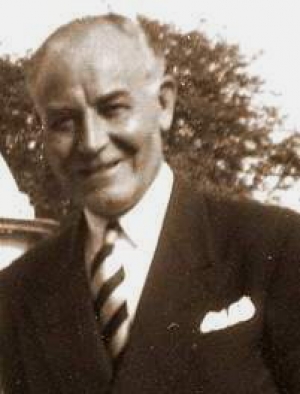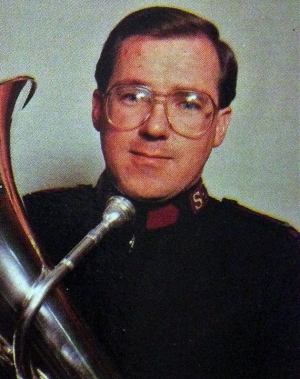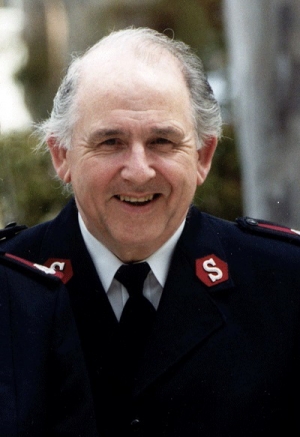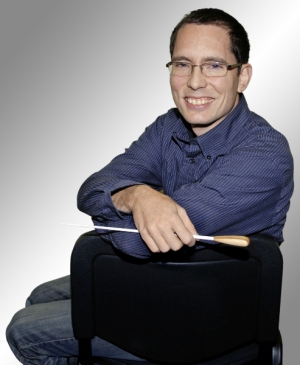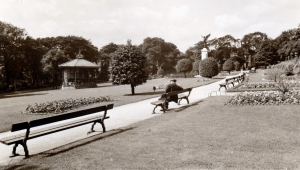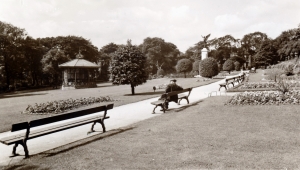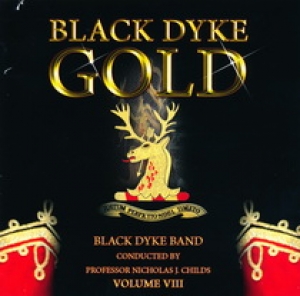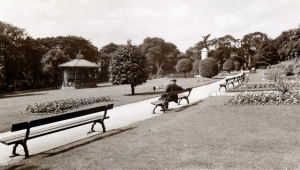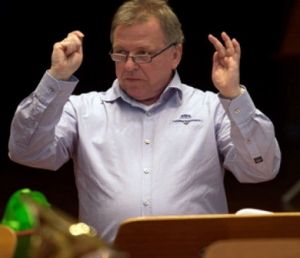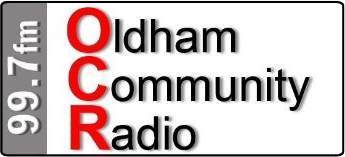
Talk Subjects
Chris Helme
George William Hespe, born in London 1900, served in the Army as bandboy and bandmaster between 1914 and 1933.. He then turned his hand to conducting brass bands, including the Sheffield Police Band and briefly Grimethorpe. For a time played tuba in the BBC Northern and Hallé orchestras.
His compositions include the marches King O'the Clouds, Lone Pilot, Kinderscout, Atlantic Patrol and Men of Steel, the trombone solo Melodie et Caprice (sometimes anglicised to Melody and Caprice), a Welsh Fantasy, no fewer than eight suites for military band and bagpipes and most notably, the suite The Three Musketeers, adopted as the test piece for the British Open Championships in 1953.
He rose to prominence conducting Ferodo in 1955 when the band became British Open Champions, playing Erik Leidzen’s ‘…Sinfonietta for Brass Band….‘
On this week's show we feature his composition The Three Musketeers played by Black Dyke Mills conducted by Derek Broadbent.
Enjoy
From its beginnings in Adelaide, Australia the Salvation Army spread rapidly and soon reached Victoria where the first corps in the state was opened in December 1882 at North Melbourne. By 1890, just 10 years after the first meeting in Adelaide, there were 255 corps and 419 outposts throughout Australia, manned by 747 officers, mostly "home-grown".
As new corps were opened bands appeared and proliferated. They not only attracted people to listen to the gospel but also helped to raise funds for the rapidly expanding spiritual and social work of the Army. At that time there was not much entertainment, and music whether good, bad or indifferent soon attracted a crowd.
Early in 1890 it was felt that headquarters in Melbourne should benefit from the services of a band and a small group of officers and employees was brought together under the leadership of Staff Officer Jeremiah Eunson to assist in meetings conducted by Army leaders and to campaign in the area.
The War Cry of February 22, 1890 reported:
The headquarters band is now an established institution. It is in the charge of Bandmaster Eunson and consists of the following: Major Barritt (Field Secretary), Staff Captain Leigh (Secretary for Trade), Staff Captain Fisher (accountants department), Adjutant Clarkson (trade department), Adjutant Pestell (correspondence), Ensign Stephens (The War Cry), Captain Hungerford (accountants department), Lieutenant Clark (trade department), Comrade Little (engraving), Scribes Sandall and Saunders (Field Secretary's department) and Willie, the messenger.
The musical ability of the group was undoubtedly suspect, none of the players being accomplished or experienced, and in fact some of them were complete strangers to the mysteries of brass instruments. It is unlikely that their efforts would have gained commendation from musicians, but this was the infant group which grew to maturity and became the Melbourne Staff band.
Ken Waterworth is the current bandmaster having joined the MSB in 1979 on euphonium. He was appointed bandmaster in 1994.
Major Terry Camsey was born in Cheltenham, England, on June 23, 1935, he emigrated to the U.S. in 1972.
In the Western Territory, he served as Golden State divisional music director from 1984–1986, before moving to territorial headquarters (THQ) as evangelism and programs secretary, holding that position until 1993. He was territorial corps growth secretary until 1995, when he transferred to the U.K. Territory, where he served as church growth and planned giving secretary. In 1998, he returned to the U.S. Western Territory as territorial vision and corps growth and men’s program secretary. He retired in 2000.
Earlier in his professional career, Camsey worked as a senior environmental health officer and a food services manager.
Camsey was an accomplished musician and composer. For many years he played with the International Staff Band (ISB), where he was a noted cornet soloist. After moving to New York, he played with the New York Staff Band from 1976–1980.
In retirement he continued to pursue his interests of music and church growth theory.
His cornet solo “Life’s Pageant”, written in the style of Percy Code, was premiered by Terry and remains very popular.
On this week’s show we play a track from a CD that Terry and his friend Ivor Bosanko produced in 2005
Mario Bürki (born October 26, 1977 ) is a Swiss composer.
He studied Brass Music Directorate at the Conservatory in Bern and achieved the title "Very Good" on the Diploma and the Higher Education Card. Bürki attended masterclasses with Urs Peter Schneider (composition) and Toshiyuki Shimada and Andreas Spörri (conducting). His first major work - Scenes from: Max and Moritz - was awarded the second prize at the Composition Competition of the World Association for Symphonic Bands and Ensembles ( WASBE ) in Lucerne and his composition Indian Fire was awarded the special prize at the Flicorno d'Oro Junior (Italy) competition awarded for the most original concert piece.
Two of his works (Cap Hoorn and 1405: The Berne Fire ) premiered at the Mid Europe in Schladming. In November 2005, 1405: The Berne Fire was performed by the world-famous Spanish wind band La Artistica Buñol in Valencia . Mario Bürki is Music Director at the Music School of Youth Music Ostermundigen. As an instrumentalist he plays trumpet, piano and organ. Mario Bürki regularly receives composition commissions.
His compositions include a number of works for wind bands and several for brass bands. On this week’s show we feature his 2019 European Brass Band Championships (Challenge Section) test piece ‘Terezin’.
Featuring:
Cory Band MD: Dr. Robert Childs / Philip Harper
Brighouse and Rastrick Band MD: Dr. David Thornton
GUS Band MD: Chris Jeans
Foden's Band MD: Michael Fowles
Frans Violet – 1954 - is a Belgian conductor, music teacher and trumpet player.
He received his lower and secondary music education from the age of eight at the then Municipal Music Schools of Boom and Willebroek. He studied at the Royal Flemish Conservatory in Antwerp. He made his debut as a trumpet player in 1972 in the orchestra of the Royal Mint Theatre in Brussels. Subsequently he switched to the then symphony orchestra of the Belgian Radio and Television Broadcaster (BRT), now the Flemish Radio and Television Broadcaster (VRT).
In 1984, he became a teacher for brass instruments at the Music Academy of Willebroek. He was also a teacher of HaFaBra (HAFABRA Music specializes in wind band music) at the Lemmens Institute in Leuven. Since 1993 he is a teacher for saxhorn at the Royal Flemish Conservatory in Antwerp, his Alma Mater.
From 2002 to 2008, he was the conductor of the Brassband Limburg. For a certain time he was also conductor of the Royal Fanfare band "St. Caecilia", Leest, Mechelen. He is the conductor of the Royal Fanfare Concordia, Tisselt.
Violet is a sought-after guest conductor with brass bands in the United Kingdom, Switzerland and Norway.
Since 1979, Frans Violet has been the conductor of the Brassband Willebroek with which he has been successful at competitions at home and abroad, including vice-world champion in 2005 at the World Music Competition in Kerkrade and several times European champion at the European Brass Band Championships.
In 2017 he wrote history with the Brassband Willebroek, as the first Belgian band ever, the brass band can call itself world champion for four years after winning the World Music Competition in Kerkrade.
On 25 October 2016, the municipality of Willebroek awarded Violet the title of honorary citizen.
Frans Violet is on this week's show conducting Brass Band Willebroek.
Talks Available
All the presentations are timed to last up to an hour except where shown - questions are gladly taken after the presentation. All have been presented to male, female and mixed audiences of varying age groups.
-
A Postcard from the Past
The Sunny Vale Pleasure Gardens, Halifax - Yorkshire’s Alton Towers of the…
-
All in a Days Work
Reminiscences from 30 years in the Police Service – (humorous lecture presentation)…
-
Legends from the world of Brass Bands
(Info-tainment – digital slides & music) – 1 hour presentation.
-
A Week in May
A story based on the Murder of Lord Frederick Cavendish (of the…
- Memories of Christmas Past
-
The Road to Publication
In 1979 I was asked to assist in presenting a series of…
-
How we used to live
We have all seen and experienced changes in our lives. Bring back…
- Holiday Memories from the Past
-
Other Folks Rubbish (Not suited to a Zoom presentation)
With a local history theme… – (thought provoking humorous lecture presentation) –…
- So you want to be a Pirate ? - The life of a Pirate was not all that it seemed
- Superstitions, New Year Resolutions and the Origins of St Valentine's Day
- Brighouse at Work
-
Sorry but I am not able to accept any more face to face talk bookings at the present time ONLY ZOOM TALKS


